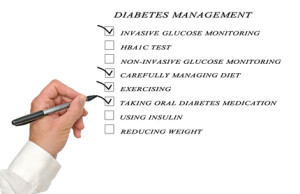The management of diabetes mellitus is based primarily on the regulation of blood sugar (blood glucose) levels in the body. Achieving optimal blood sugar control can prevent or delay both the short- and long-term complications of diabetes. When people keep their blood sugars within the target ranges prescribed by their doctors, they can avoid experiencing hypoglycemia (when blood glucose is too low) or hyperglycemia (when blood glucose is too high). People with well-controlled blood sugars also reduce their risk of developing kidney disease, heart disease, nerve dysfunction that can lead to amputations, and vision problems that can lead to blindness. The conditions just mentioned are all long-term complication associated with diabetes.
 For people that have diabetes, they can best monitor their blood sugar control by regularly using a blood glucose meter to test levels when fasting, before meals, and 2 hours after meals. They can also have routine lab work done by a physician that includes a fasting blood glucose test and hemoglobin A1C, which reflects average blood sugar levels over the past 2-3 months. It is crucial that people with diabetes monitor these parameters, because many different factors can affect blood sugar levels. Most people with diabetes are familiar with at least a few of these things, but did you know that food, physical activity, medication, illness or infection, alcohol, menstruation/menopause, and stress can all have a significant impact on blood sugars? Therefore, it is important that anyone with diabetes understand how these factors affect blood sugars and what they can do to best manage their disease.
For people that have diabetes, they can best monitor their blood sugar control by regularly using a blood glucose meter to test levels when fasting, before meals, and 2 hours after meals. They can also have routine lab work done by a physician that includes a fasting blood glucose test and hemoglobin A1C, which reflects average blood sugar levels over the past 2-3 months. It is crucial that people with diabetes monitor these parameters, because many different factors can affect blood sugar levels. Most people with diabetes are familiar with at least a few of these things, but did you know that food, physical activity, medication, illness or infection, alcohol, menstruation/menopause, and stress can all have a significant impact on blood sugars? Therefore, it is important that anyone with diabetes understand how these factors affect blood sugars and what they can do to best manage their disease.
Eating a healthy and well-balanced diet is one of the most important components of controllingdiabetes. When foods that contain carbohydrates are eaten, blood sugar levels increase. This increase is something that happens in people with and without diabetes. However, when people have diabetes, their body is not able to transport the glucose from the blood into the body’s cells where it is used as fuel. Over time, elevated blood sugars can damage the body’s blood vessels and organs. Since carbohydrates are an important source of energy, it is necessary to eat carbohydrate-containing foods, but in the right amounts.By following the proper nutrition guidelines, being physically active and taking diabetes medications (if prescribed) according to the doctor’s directions, it is possible to balance carbohydrate intake and blood sugar levels.
 Foods that contain carbohydrates include: starches (breads, grains, cereals, rice, pasta, dried beans) and starchy vegetables (potatoes, peas and corn), fruit, and some dairy products (milk and yogurt). Foods that are categorized under the non-starchy vegetable, fat or meat/protein food group do not raise blood sugars and are an important component of meals and snacks that can help regulate blood sugar levels. Meal planning and preparation is an important component of diabetes management. Choosing healthy foods and eating the correct portion of those foods also helps to achieve or maintain a healthy weight, which is another important factor in both controlling blood sugars and reducing the risk of related cardiovascular disorders such as high blood pressure (hypertension) and elevated cholesterol.
Foods that contain carbohydrates include: starches (breads, grains, cereals, rice, pasta, dried beans) and starchy vegetables (potatoes, peas and corn), fruit, and some dairy products (milk and yogurt). Foods that are categorized under the non-starchy vegetable, fat or meat/protein food group do not raise blood sugars and are an important component of meals and snacks that can help regulate blood sugar levels. Meal planning and preparation is an important component of diabetes management. Choosing healthy foods and eating the correct portion of those foods also helps to achieve or maintain a healthy weight, which is another important factor in both controlling blood sugars and reducing the risk of related cardiovascular disorders such as high blood pressure (hypertension) and elevated cholesterol.
Since nutritional needs including grams of carbohydrates per day, vary based on a person’s height, weight, age, gender and physical activity level, it is important for people with diabetes to know how many total calories and servings of carbohydrates they need. Dietitians are experts in the field of nutrition and can provide valuable information and individualized education for people living with diabetes. The foundation for the nutritional management of diabetes depends on what types of food a person eats, how much is eaten, and when meals/snacks are eaten. A Dietitian can provide education on reading nutrition facts labels, carbohydrate counting, meal timing, weight loss and healthy cooking methods. By understanding these concepts and how they work together to help regulate blood sugars, one can gain an effective tool to better manage diabetes.
Kristin Hirahatake is a registered dietitian. Kristin is passionate about translating scientific research findings into practical applications that people can directly implement. She continues to maintain an active role in the field of nutrition research by co-authoring peer-reviewed journal articles. Her most rewarding experiences as a dietitian have been to see positive changes and improvements in the lives of her clients.
References
American Diabetes Association.Carbohydrate Counting. Retrieved October 23, 2013. http://www.diabetes.org/food-and-fitness/food/planning-meals/diabetes-meal-plans-and-a-healthy-diet.html.
American Diabetes Association.Making Healthy Food Choices. Retrieved October 23, 2013. http://www.diabetes.org/food-and-fitness/food/what-can-i-eat/making-healthy-food-choices.html.<
Academy of Nutrition and Dietetics.Nutrition Care Manual: Type 2 Diabetes Nutrition Therapy.Retrieved October 31, 2013, http://nutritioncaremanual.org/.
Mayo Clinic. Diabetes Management: Howe lifestyle, daily routine affect blood sugar. June 2011. http://www.mayoclinic.com/health/diabetes-management/DA00005/NSECTIONGROUP=2.
